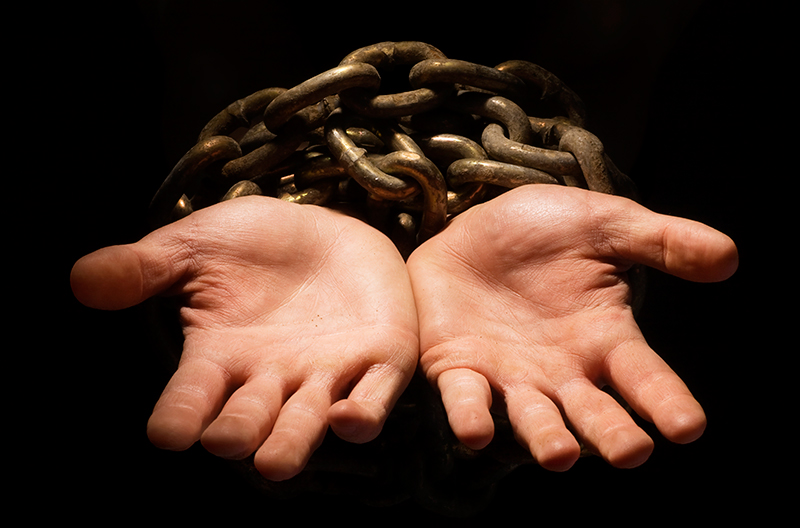
Rev. Dr. Gottfried Martens is pastor of Trinity Lutheran Church in Berlin-Steglitz, a member congregation of Germany’s Independent Evangelical Lutheran Church (SELK). This congregation, along with several other SELK churches, have welcomed hundreds of converts to Christianity in recent years, mostly Iranian and Afghan refugees living in Germany. Dr. Martens and his congregation were widely covered in international media in early 2016 for their work among refugees. But the German government has recently begun to deny en masse the refugee claims of many of these converts, following what Dr. Martens is calling deeply flawed refugee hearings.
“Desperate reports have been reaching me from members of our congregation,” he writes in a letter released December 23. “At this time, the Federal Ministry for Immigration and Refugees is rejecting almost all applications for asylum from our Iranian members, and in many cases also from our Afghan congregational members and candidates for baptism, and is sending them deportation notices.”
Germany has recently increased the number of personnel responsible for hearing asylum applications—a necessary change, given many refugees have been waiting three years for their first hearing. “Yet not even in our worst nightmares could we have pictured what this change would entail,” Dr. Martens says. “Many [of those hearing the cases] are manifestly clueless about the situation of Christians in Iran and Afghanistan, and worse yet they are utterly clueless concerning questions relating to the Christian faith. But all of this does not prevent them from assuming the role of self-appointed experts, whose questions ‘unmask’ the supposedly deceitful Iranian asylum applicants one after another, even when those hearing the cases don’t even know the difference between the [Apostle’s] Creed, and the Our Father [Lord’s Prayer].”
Instead, refugees are being tasked with obscure or even irrelevant questions to determine the “authenticity” of their conversions. “Questions are put such as the names of the two sons in the parable of the Prodigal Son, or what Martin Luther died of, or the occasion of Queen Margarethe of Denmark’s recent visit to Wittenberg,” Dr. Martens reports. “In this way, Christians who learned the first elements of the Christian faith in their house church in Iran are well and truly hung out to dry. Many hearings are more like kangaroo courts in which our congregational members and candidates for baptism have absolutely no chance of presenting what is important to them.”
Dr. Martens further reports that those hearing the cases are dismissing or even mocking the refugees when they express their faith in the importance of Christ dying on the cross for their sins. “What the applicant says here makes absolutely no sense,” one official is said to write in his official reports. Those tasked with translating for the court—mostly Muslims with little knowledge of the Christian faith, and in some cases reportedly hostile to it—are also accused of incorrectly or even falsely translating what the refugees say during their hearings. Such improper questioning and translating seriously damages the applicants’ claims for refugee status, as the final decision is made elsewhere in Germany on the basis of these reports and transcripts.
Dr. Martens says the flaws in the system are so great that the situation must inevitably be raised to a higher court. “Orders have obviously been given from above no longer to recognize Iranian converts as having the right to asylum in our country,” Dr. Martens suggests. “The systematic failure of the Federal Ministry in hundreds of cases must come to the light of day through the efforts of the superior courts.”
The challenges come after a year of other difficulties, as converts to Christianity have faced increasing persecution from Muslim refugees angry at their conversions from Islam. “This year many of them suffered violent attacks from Muslim residents of their institutional homes and from Muslim watchmen once they learned of their conversion. Time and time again—most recently last week—we have had to collect people from residences, in order to prevent worse from befalling them,” he notes. The attacks even led SELKS’ bishop earlier this year to call on the government to give Christian refugees to be given separate accommodations from Muslim refugees. “But our congregational members and candidates for baptism are continually finding that those who attack them and threaten them with death have no problem securing the right of abode here in Germany, while they themselves—the ones under attack—are ‘exposed’ by the Federal Ministry as not entitled to asylum.”
As an example, Dr. Martens notes the case of six Christian converts who were beaten by a group of nearly 100 radical Muslim asylum applicants in February 2016. Police dogs had to be released in order to protect the Christians. And yet the police investigation was eventually dropped. Now, the six Christians are among those receiving deportation notices.
Despite the challenges, Dr. Martens reports good news too for his congregation. In his letter he goes on to explain the process by which refugees are instructed in the Christian faith prior to baptism—or excluded, if a genuine conversion is not evident. Currently baptisms sit at between 30 and 40 a month. And renovations to the building to accommodate more refugees continue apace.
Dr. Martens ends his letter with a request for prayer. “Please keep praying for the work here in Stegltiz,” he writes. “It is and remains in many ways a spiritual battle loaded with many afflictions and temptations. And yet for me personally, even after 25 years, it remains the most beautiful service in the world, which I would never exchange for anything else. Pray above all that all the members who have found their way to our congregation in the last years may continue to hold to Christ and not let their love for their Lord falter!”
You can download Dr. Martens’ full letter here. The translation is by Rev. Dr. John Stephenson of Concordia Lutheran Theological Seminary (St. Catharines, Ontario).
SELK is a member church of the International Lutheran Council (ILC).
———————
Republished from The Canadian Lutheran.

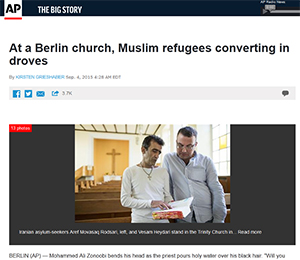
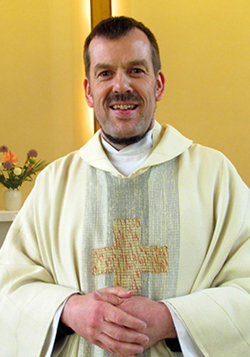
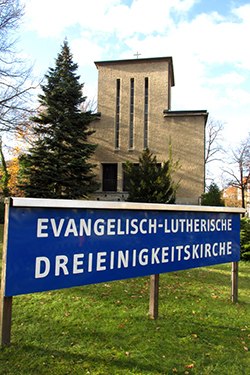
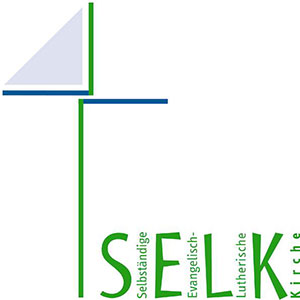 GERMANY – The Independent Evangelical Lutheran Church (SELK) continues to see remarkable numbers of Iranian Muslims converting to Christianity. According to a recent SELKinfo story, Rev. Dr. Gottfried Martens of St. Mary’s Lutheran Church (Steglitz, Berlin) reports that the number of congregational members and applicants for baptism of Persian background at his church has recently grown by 75%. The same report notes three groups of Iranians were preparing for baptism at the time, with the first group scheduled to have been baptized December 15, 2013.
GERMANY – The Independent Evangelical Lutheran Church (SELK) continues to see remarkable numbers of Iranian Muslims converting to Christianity. According to a recent SELKinfo story, Rev. Dr. Gottfried Martens of St. Mary’s Lutheran Church (Steglitz, Berlin) reports that the number of congregational members and applicants for baptism of Persian background at his church has recently grown by 75%. The same report notes three groups of Iranians were preparing for baptism at the time, with the first group scheduled to have been baptized December 15, 2013.